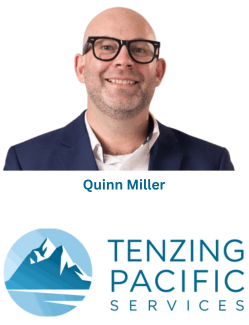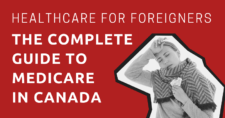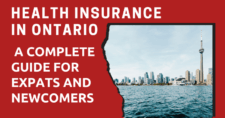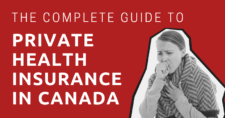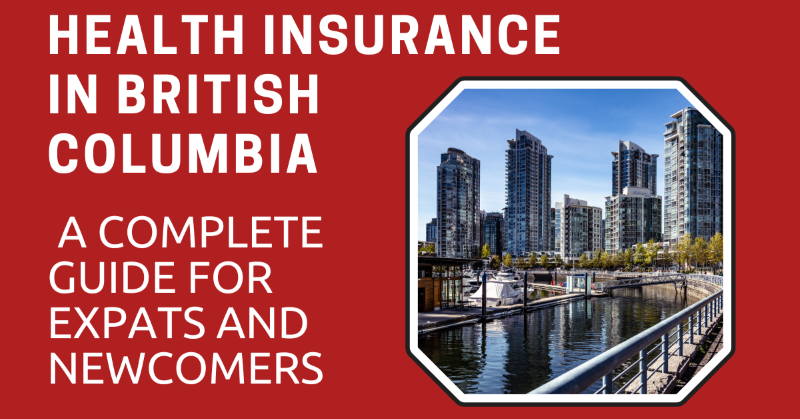
This article will take approximately 29 minutes to read. Don't have the time right now? No worries. Email the ad-free version of the article to yourself and read it later!
Learn how health insurance works in British Columbia, including MSP coverage, private and international options, eligibility, costs, and how to apply.
If you’re planning to move to Canada, one of the first things you need to figure out is health insurance. Canada’s public healthcare system is often praised as one of the best in the world. But what many newcomers don’t realize is that the system isn’t the same across the country, as each province and territory manages its own healthcare.
If you’re moving to cities like Vancouver, Victoria, or Kelowna, you’ll need to understand how health insurance works in British Columbia. The good news is that public health insurance in BC, known as the Medical Services Plan (MSP), is among the most comprehensive in Canada.
It covers essential medical services such as hospital care and doctor visits. However, not everyone qualifies for it right away, and there’s usually a waiting period before your coverage begins.
In this guide, I’ll walk you through everything you need to know about health insurance in British Columbia, from public options like MSP to private and international plans. By the end, you’ll know which coverage works best for your situation as a new resident in BC.
Disclaimer: This article may include links to products or services offered by ExpatDen's partners, which give us commissions when you click on them. Although this may influence how they appear in the text, we only recommend solutions that we would use in your situation. Read more in our Advertising Disclosure.
Contents
- Key Takeaways
- Overview of BC’s Public Health Insurance (MSP)
- MSP Application
- Who Can Apply for the MSP in British Columbia?
- Private Insurance
- Local Private Insurance
- International Health Insurance
- Who Uses International Insurance in British Columbia
- International Health Insurance Coverage
- Annual Limits
- Area of Coverage
- Hospitalization
- Outpatient Treatment
- Medical Evacuation and Repatriation
- Telehealth
- Other Benefits
- What International Insurance Can’t Do
- International Insurance Price
- Which International Insurance Providers to Use
- Health Insurance Comparison
- Travel Insurance
- International Insurance vs Travel Insurance
- Which Health Insurance Should I Get in British Columbia
Key Takeaways
- The main public health insurance in British Columbia is the Medical Services Plan (MSP), which covers essential medical care such as doctor visits and hospital stays.
- Most residents don’t pay premiums, but international students must pay CAD 75 per month for MSP coverage.
- There’s normally a three-month waiting period on average before MSP starts, so newcomers should get travel or private insurance during that time.
- MSP doesn’t cover prescription drugs, dental, vision, ambulance services, or private hospital rooms.
- Local private insurance can fill these gaps and usually costs CAD 80–150 per month.
- International health insurance offers global coverage and access to private clinics, though it’s more expensive (around USD 150–400 / CAD 205–545 per month).
- Private or international insurance can’t skip public system queues, but can help you access private care or treatment abroad faster.
- Always apply for MSP as soon as you arrive in BC and review your options carefully to stay covered at all times.
Overview of BC’s Public Health Insurance (MSP)
First, let’s take a look at the public insurance provided by British Columbia, called the Medical Services Plan, or MSP for short. The MSP is managed by Health Insurance BC (HIBC) under the Ministry of Health.

This is the main health insurance option for expats in British Columbia and should be the first one you look into when settling in the province.
MSP Coverage
The coverage under the Medical Services Plan (MSP) is quite comprehensive. It pays for most medical treatments that are deemed medically necessary by a licensed doctor. This includes:
- Doctor visits
- Hospitalization (shared room only; you can upgrade to a private room and pay the difference. In some cases, MSP covers private or semi-private rooms if medically required)
- Medical scans and diagnostic tests (when prescribed by a doctor)
- Medications (only those administered during hospitalization)
- Maternity care
- Medically required dental and vision care in hospital settings (routine checkups are not covered except certain age groups)
- Medically required eye examinations provided by an ophthalmologist or optometrist for adults aged 19–64
- Annual eye examinations for children aged 0–18 and seniors aged 65 and older
In short, MSP covers most treatments that are medically necessary, including pre-existing conditions. The main condition is that you must visit a doctor or hospital within the MSP system. If the attending doctor determines that your treatment is medically necessary, MSP should cover it.
MSP Supplementary Benefits
The Medical Services Plan (MSP) also provides partial coverage for certain additional health services. It contributes CAD 23 per visit, for up to 10 visits per calendar year, if you receive treatment such as:
- Acupuncture
- Chiropractic care
- Physical therapy
- Massage therapy
- Non-surgical podiatry
However, these supplementary benefits are available only to specific groups, including:
- Low-income residents with a household income below CAD 42,000 per year
- People with disabilities
- Seniors receiving the Guaranteed Income Supplement (GIS)
Because of these eligibility rules, most expats, including international students, do not qualify for MSP supplementary benefits.
You can read more about these benefits on the BC Government’s official page on MSP Supplementary Benefits.
Medical Benefits Outside of the British Columbia
Another advantage of the MSP program is that it provides some coverage when you need medical treatment outside British Columbia.
- Travel within Canada: If you travel to another Canadian province or territory (except Quebec), MSP may cover the full cost of medically necessary treatment at a public hospital. However, prescription medications and ambulance services are not covered, and you cannot use MSP at private clinics.
- Travel outside Canada: If you travel outside of Canada, MSP offers very limited protection. It covers only CAD 75 per day for hospital care. This amount is far below the typical cost of medical treatment in most countries, especially in the United States.
While this limited coverage can help in emergencies, it’s not enough for most situations. The Government of British Columbia itself advises residents to purchase travel insurance or additional private coverage before leaving the province, even for short trips.
MSP Exclusions
While MSP covers most essential medical services when visiting a hospital or doctor, there are still several exclusions you should know about.
Medications and Medical Supplies
The most significant exclusion is prescription medications and medical supplies used outside of hospitals. This means that after a regular doctor visit, you’ll receive a prescription and need to buy your medications at a pharmacy, paying the full cost out of pocket.
However, you may be able to reduce these costs through the Fair PharmaCare program, which provides income-based cost-sharing on approved medications.
Private Room
Another major exclusion involves hospital stays. MSP only covers standard ward rooms, not private or semi-private rooms, unless your doctor confirms that the upgrade is medically necessary. In most cases, this won’t apply. If you prefer a private or semi-private room, you’ll need to pay for the upgrade yourself.
Ambulance Services
Ambulance services are also not covered by MSP, whether the transportation is within British Columbia or outside the province.
Other common exclusions, similar to those found in many insurance systems worldwide, include:
- Eyeglasses, contact lenses, and routine vision care for adults aged 19–64 (unless medically required)
- Most dental services, such as cleanings, fillings, crowns, root canals, and implants
- Medical devices and supplies purchased for home use
- Cosmetic treatments
- Elective or non-essential medical procedures
You can view the complete list of MSP exclusions on the official BC government website.
Additional Fees
In addition to the main exclusions, there are certain treatment-related costs that you may need to pay out of pocket, even when the service itself is covered by MSP, including:
- Therapeutic drugs, such as allergy injections or cortisone shots administered in a clinic or hospital
- Medical devices, including pessaries, intrauterine devices (IUDs), crutches, splints, braces, and tensor bandages
- Material upgrades, when you choose a more expensive option than the standard item (for example, a fiberglass cast instead of a plaster cast)
- Extensive dressings or special bandages, such as those used for major burns or complex wounds
These items are generally considered additional materials or elective upgrades. It’s a good idea to check with your doctor or healthcare provider before treatment to confirm which items are covered by MSP and which ones you may need to pay for yourself.
List of Hospitals that Accept MSP
With MSP, you can visit any hospital in British Columbia that accepts the plan. Most of these are public hospitals, but many private clinics also participate.
Here’s a sample of well-known hospitals in British Columbia that accept MSP:
- Vancouver General Hospital (Vancouver Coastal Health)
- Royal Columbian Hospital (Fraser Health)
- Burnaby Hospital (Fraser Health)
- Royal Jubilee Hospital (Island Health)
- BC Children’s Hospital (Provincial Health Services Authority)
- Mount Saint Joseph Hospital (Providence Health Care)
You can find the full list of hospitals that accept MSP on the BC Government’s official hospital directory.
Please note that some private clinics may accept walk-in. But in many cases, you need to make an appointment in advance. And there’s no guarantee when you will get an appointment.
In case of emergency, you can visit the ER department in a hospital
Wait Time
Like many public healthcare systems around the world, wait times are one of the biggest challenges under MSP. How long you wait depends on your health and where you live in British Columbia.
If your situation is urgent or life-threatening, you’ll receive treatment right away to stabilize your condition. However, for non-urgent cases, it’s common to wait several hours before seeing a doctor, even for a short consultation.
When it comes to seeing a specialist, delays can be much longer. According to a 2024 survey by Doctors of BC:
- Urgent cases typically wait around 4 weeks
- Semi-urgent cases also average around 4 weeks
- Non-urgent cases may wait up to 10 months
For example, one Reddit user reported waiting more than 10 hours at the BC Children’s Hospital emergency department just to see a doctor for a fever.
Disadvantages
In addition to long wait times, there are two additional drawbacks of the Medical Services Plan
Walk-in
One of the biggest drawbacks of the MSP system is the difficulty of finding clinics that accept walk-in patients. There’s currently a shortage of family doctors and general practitioners across British Columbia, which makes accessing same-day care challenging.
If you suddenly develop a fever or a minor illness and try to visit a clinic without an appointment, there’s a good chance you won’t be seen.

Many walk-in clinics have stopped accepting new patients or now require appointments in advance. Depending on where you live, you might even have to wait several days or more than a week for a consultation.
The good news is that if you already have a family doctor, your wait time will usually be much shorter. In many cases, you can get a same-day or next-day appointment for routine issues. However, the challenge lies in finding a family doctor in the first place. Due to the ongoing shortage of practitioners, many clinics are not taking new patients, especially in smaller cities and rural areas.
Waiting Period
It generally takes about three months after your application for MSP coverage to begin. During this waiting period, you won’t be covered by public health insurance.
During that period, you need to find another form of insurance. You can use travel insurance, private health insurance, or an international expat plan.
MSP Application
Here’s some information about applying for the Medical Services Plan in British Columbia.
Who Can Apply for the MSP in British Columbia?
Basically, if you are planning to live in British Columbia for more than 6 months in a year, you need to apply for the MSP. This also includes international students or those who come to Canada and live in British Columbia for work.
On the other hand, if you are a tourist, digital nomad, or short-term visitor, you won’t be able to apply for it.
How to Apply
There are three main ways to apply for the Medical Services Plan (MSP) in British Columbia:
- Online through the Government of British Columbia website
- By mail
- In person at a Service BC location
The easiest and fastest method is to apply online. You’ll need to upload a few supporting documents, such as:
- Passport
- Visa
- Work permit
- Marriage certificate (if applicable)
You can check the full list of acceptable documents on the official MSP application page. The online process usually takes about 15 minutes to complete.
Tip: Apply for MSP as soon as you arrive in British Columbia. It typically takes around three months for your coverage to start after approval. So, after you move to the British Columbia, apply for the Medical Services Plan right away.
MSP Cost
Fortunately, most residents in British Columbia do not need to pay any premiums for the Medical Services Plan. It’s fully funded through provincial taxes. However, if you’re an international student, there is a monthly fee of CAD 75 for MSP coverage.
Should You Rely on the Medical Services Plan?
In my opinion, it depends on your expectations and lifestyle. The MSP system works well for urgent or emergency care, where doctors can treat you right away. The coverage is comprehensive and free, making it a great option for essential medical services.
However, the system struggles when it comes to preventive care or conditions that require early detection, such as cancer or chronic illnesses without obvious symptoms. According to discussions on Reddit, many BC residents have reported long waits to see specialists, which leads some people to travel abroad to countries like Thailand for faster and more affordable treatment.
Because of this, if you prefer shorter wait times or need access to private hospitals, it might be worth getting international health insurance or private insurance to complement MSP coverage.
It’s also important to remember that MSP coverage mainly applies within Canada. If you travel abroad often, you should have travel insurance or international insurance to ensure continuous protection outside the province or country.
Private Insurance
Since the Medical Services Plan (MSP) in British Columbia only covers treatments that are medically necessary, it does not include most prescription drugs, dental or vision care, or ambulance services.
To fill these gaps, many residents choose to purchase private health insurance.
In addition, newcomers and returning residents often get private or travel insurance to stay protected while waiting for their MSP coverage to begin, as there’s usually a three-month waiting period after applying.
There are two main types of additional health insurance options available in BC:
- Local insurance
- International insurance
Each serves different needs depending on how long you plan to stay in Canada and whether you travel frequently.
Let’s take a closer look at both options.
Local Private Insurance
Local private insurance is popular to those who want to get additional coverage that doesn’t include on the Medical Services Plans, especially for prescribed medications, private room, dental care, and vision care.
Local Private Insurance Coverage:
This is normally covered by local private insurance plan. Please note that the way it works can varies between plans and options.
- Prescription drugs (outside hospital)
- Dental care (cleanings, fillings, crowns, dentures)
- Vision care (eye exams, glasses, contact lenses)
- Paramedical services (physiotherapy, massage, chiropractic, acupuncture, naturopathy)
- Mental health therapy or counselling
- Medical devices and supplies (braces, orthotics, hearing aids)
- Private/semi-private hospital room
What’s Not Covered by Local Private Insurance
An important point to note is that you can’t use private insurance to skip queue. In fact, in British Columbia and many other provinces and territorials in Canada, private healthcare rarely exists.
That means you still need to have a long waiting time from the MSP system. However, depending on the plan you have, your local insurance may cover things like MRI and scans in private clinics, which may end up speeding the process.
Anyway, in addition to that, there are also things that don’t covered by private insurance:
- Anything that doesn’t covered by the MSP
- Cosmetic treatment
- Ambulance services unless specified specifically by your plan
- International coverage. But some plan may come with emergency coverage.
Cost and Payment
The cost of local private insurance in British Columbia varies depending on your age, health condition, level of coverage, and the insurance provider. On average, you can expect to pay CAD 80 to 150 per month for an individual plan.
It’s important to note that most private health insurance plans do not provide full coverage. For example, a typical Sun Life plan might cover 80% of prescription drug costs up to the first CAD 5,000 per year. After that limit, you’ll need to pay the remaining balance out of pocket.
In other words, in addition to paying your monthly premium, you should also be prepared to cover co-payments, deductibles, and uncovered expenses.
Local Insurance Providers
There are many local health insurance providers across Canada. Since the healthcare industry is highly regulated, the benefits and protections offered by each company are often similar. Here are some of the major local providers in British Columbia and Canada:
- Pacific Blue Cross, BCAA Health Insurance, and Green Shield Canada: These three companies are big and known for direct billing
- Sun Life and Manulife: Their plans tend to be more affordable. But in many cases, you need to pay first and claim later.
There are other options such as Canada Life. The main differences come down to pricing, customer service, and optional add-ons.
How to Use Local Private Insurance
Using your local private insurance is straightforward. When you receive medical treatment, MSP pays first for all services it covers. Your private insurance then pays for any remaining eligible costs, such as prescriptions, dental work, or private hospital rooms.
In most cases, you’ll need to pay for services upfront and then submit a claim to your insurer for reimbursement. Many providers now offer online claim systems that make this process quick and convenient.
Should You Get Local Private Insurance?
Getting local private insurance is worth considering if:
- You rely primarily on MSP but want extra coverage for things not included, such as prescription drugs, dental care, or private hospital rooms.
- You live mainly in Canada and don’t travel abroad frequently. Local plans typically cover care within Canada only and may offer limited or no international coverage.
If you travel often or plan to live in multiple countries, you might find international health insurance a better fit, as it offers coverage both inside and outside Canada.
Also, if you are employed in Canada, there’s a good chance that you’re already covered through a group health insurance plan provided by your employer.
International Health Insurance
In addition to local private insurance, you can also buy international health insurance. This works like getting a completely new insurance plan that provides coverage both in Canada and abroad, allowing you to rely mainly on it instead of the public system.
There are mixed opinions about whether international insurance is worth it for expats and residents in Canada.

On one side, some people believe it’s not necessary because MSP already provides excellent coverage for essential healthcare needs. International insurance can be expensive, and even with it, you can’t skip queues in Canada’s public healthcare system, since hospitals and specialists must prioritize patients based on medical urgency, not insurance type.
On the other hand, some expats choose international health insurance because they travel abroad frequently and need continuous coverage outside Canada. Others prefer the flexibility of getting treatment at private clinics, where the process is often faster than relying solely on MSP. It’s also common for newcomers to buy international insurance while waiting for MSP approval, which typically takes around three months.
Who Uses International Insurance in British Columbia
From what I’ve gathered, expats and residents in British Columbia use international health insurance for several reasons:
- They aren’t eligible for MSP, such as those who stay in BC for less than six months per year.
- They need temporary coverage while waiting for MSP to begin.
- They require coverage abroad, especially those who travel regularly for work or leisure.
- They want faster access to private healthcare facilities or prefer to receive treatment in another country without long wait times under the public system.
In short, international insurance in British Columbia is best suited for expats, frequent travelers, and those who prefer private medical options or international coverage beyond what MSP and local private insurance provide.
International Health Insurance Coverage
International health insurance in Canada works much like it does elsewhere in the world. It’s designed to give you flexibility, global coverage, and access to private healthcare when you need it most.
Here’s an overview of what to expect from international plans.
Disclaimer: Insurance policies vary by provider and plan. The following information is meant to help you understand the key features you can expect. Always read your policy documents carefully and confirm all details in writing with your broker or insurance representative.
Annual Limits
Most international insurance plans come with an annual limit that starts at around US$1,000,000, which is sufficient for most medical situations in British Columbia.
If you want extra peace of mind, you can choose higher coverage such as US$2,000,000 or more, especially if you plan to use international hospitals or receive care abroad.
Area of Coverage
You can usually choose between three area options:
- Regional plan: the most affordable, limited to Canada or North America
- Worldwide excluding the U.S.: mid-range cost and ideal for most expats
- Worldwide including the U.S.: the most expensive, but necessary if you want treatment in American hospitals
If you are a U.S. citizen or plan to get treatment in the U.S. for convenience or faster access, select a plan that includes U.S. coverage. Otherwise, excluding it can significantly reduce your premium.
Many plans also provide emergency coverage when traveling outside your covered region. For example, if your plan excludes the U.S. but you experience an emergency while visiting, your insurer may still cover treatment up to a lower emergency limit.
Tip: It’s also important to check country exclusions. Some insurers will not cover treatment in places such as North Korea, Russia, Cuba, or war zones, so always read the fine print.
Hospitalization
Hospitalization is the foundation of international health insurance. Your plan should cover everything medically necessary for in-patient care, including:
- Hospital room and board
- Medications and medical supplies
- Nursing care
- X-rays, MRIs, and diagnostic scans
- Surgery and anesthesia fees
Private room coverage depends on your specific plan. Some include it by default, while others require you to upgrade or pay the difference.
Outpatient Treatment
With international insurance, you can access private outpatient care at non-MSP clinics or hospitals in British Columbia. Depending on the plan, outpatient care may be included in your main policy or offered as an optional add-on.
This coverage typically includes:
- General consultations
- Diagnostic tests
- Specialist visits
- Follow-up care and medications
Medical Evacuation and Repatriation
This is one of the most valuable benefits of international insurance, especially since MSP does not cover ambulance services. If you experience a serious injury or medical emergency, such as a skiing accident or hiking injury, your plan can cover air ambulance transportation to the nearest appropriate hospital or even repatriation to your home country.
In a country as vast as Canada, where rural or mountain areas can be hours from the nearest hospital, this benefit can be a lifesaver.
Telehealth
Some private and international insurance providers, such as Cigna Healthcare, include telehealth services as part of their plans. This means when you feel unwell, you can contact a licensed doctor anytime through phone or video consultation.
If needed, the doctor can also prescribe medication, which you can pick up at a local pharmacy.
In British Columbia and many other parts of Canada, this feature can be extremely useful. As mentioned earlier, seeing a doctor through the public system often requires an appointment in advance, and same-day slots are not always available.
On top of that, hospital parking fees in BC can be expensive, and with long waiting hours, costs add up quickly.
With telehealth, you can skip all that. You can talk to a doctor from the comfort of your home, save time, and often get your prescription within hours.
Other Benefits
International and private health insurance plans may also include a variety of additional benefits, depending on the provider and coverage level. These can include:
- Maternity care (prenatal, delivery, and postnatal services)
- Mental health support, such as therapy and counselling sessions
- Alternative treatments, including acupuncture and chiropractic care
- Accommodation fees for a family member if you’re hospitalized
- Case management services, where the insurer helps coordinate your care and hospital arrangements
What International Insurance Can’t Do
One important thing to understand about healthcare in British Columbia and in most parts of Canada is that international or private insurance cannot help you skip hospital queues within the public system. Public hospitals and clinics must follow the same queue and triage process for all patients, regardless of whether you have extra insurance or not.
That said, having international insurance can still help you get treatment faster in other ways:
- If you need diagnostic tests such as MRI or CT scans, you can visit a private clinic outside the MSP network and pay through your international insurance. Once you have the results, you can show them to your MSP doctor. If the findings are serious, you’ll usually be moved up the queue for treatment. If not, you might wait several months for the same scans through the MSP system.
- You can see specialist doctors at private clinics directly without waiting for a public referral.
- You can travel abroad, including to your home country, to get treatment immediately using your international coverage. This is a common option among expats who want faster or more specialized care.
International Insurance Price
The main drawback of international insurance is its cost. Unlike local insurance, which you buy to supplement MSP coverage, international insurance works as a completely separate health insurance plan.
Premiums vary depending on several factors, including your nationality, age, deductible, cost-sharing option, area of coverage, plan level, and provider.
For example, a 40-year-old can expect to pay around US$227 per month for a basic plan from Cigna Healthcare. This plan includes an annual coverage limit of US$1,000,000 and excludes coverage in the United States.
Which International Insurance Providers to Use
There are many international insurance companies available in Canada. Some of the most popular choices among expats include:
- Cigna Healthcare: A leading provider offering comprehensive plans with flexible add-ons and global coverage. It’s a good option for expats in Canada in general. You can read my in-depth review here.
- GeoBlue: A good choice if you need coverage in the United States.
- IMG Global: Offers more budget-friendly plans suitable for long-term expats and digital nomads.
If you’re unsure which plan is right for you, it’s a good idea to talk to a licensed international insurance broker. They can help you compare coverage, exclusions, and prices from multiple providers, making it easier to find a plan that matches your needs and budget.
Health Insurance Comparison
This table gives you a quick overview of what each type of health insurance covers in British Columbia, helping you see how they can complement each other.
| Feature | MSP (Medical Services Plan) | Private (Canadian) Insurance | International Insurance |
| Coverage area | Only within British Columbia (limited coverage across Canada) | Within Canada | Worldwide |
| Works with MSP | — | Yes (supplemental) | Independent (can overlap) |
| Covers MSP waiting period | No | Yes | Yes |
| Can be used in public hospitals | Yes | Only for non-MSP services | No (MSP hospitals don’t accept it) |
| Covers private clinics in BC | No | Sometimes | Yes |
| Covers treatment abroad | Only CAD 75/day for hospital stays | Usually No | Yes |
| Prescription drugs | No (except during hospitalization) | Yes (usually 70–90% depending on plan) | Yes |
| Dental & vision | Only medically necessary | Yes (depends on plan) | Sometimes (optional add-on) |
| Average monthly cost | Free (tax-funded), CAD 75/month for students | CAD 80–150 | USD 150–400 (depends on age & coverage) |
Travel Insurance
In addition to regular health insurance, you can also consider getting travel insurance, a practical and affordable short-term option, especially while you’re waiting for your MSP to start.
Travel insurance usually covers:
- Emergency medical treatment for accidents or sudden illnesses
- Hospitalization and surgery (up to policy limits)
- Emergency evacuation or repatriation to your home country
- Trip cancellation or interruption (depending on plan)
Here are some travel insurance providers popular among expats and newcomers in Canada:
- World Nomads – A premium option, ideal if you plan to do adventure sports like skiing or hiking
- Genki – Offers a flexible monthly plan with solid medical coverage
- SafetyWing – A budget-friendly option known among digital nomads, with global coverage including travel between countries
- ACS – Provides affordable plans with good emergency and medical coverage for travelers and expats in Canada
You can use safeandnotsorry.com to compare different travel insurance plans and find one that best suits your stay duration, activities, and budget.
International Insurance vs Travel Insurance
However, it’s important to understand how travel insurance differs from international health insurance. Travel insurance is designed for short-term stays and unexpected emergencies, not for ongoing or chronic medical care.
If you develop a serious illness, they might stabilize your condition and then arrange to fly you back to your home country rather than continue long-term treatment in Canada.
Most travel insurance plans only cover you for the first few months after arrival, typically up to 6 months. It’s becoming increasingly difficult to find plans that cover longer periods.
Related article: How to Pick Good Yet Cheap Travel Medical Insurance for Canada
Which Health Insurance Should I Get in British Columbia
Here’s a simple guideline to help you decide which type of health insurance best fits your situation:
- If you’ve just arrived in British Columbia and plan to stay for more than six months: Apply for the Medical Services Plan (MSP) as soon as possible.
- While waiting for your MSP to start: Get travel insurance or international insurance to stay covered during the three-month waiting period.
- If you’re satisfied with MSP coverage: Consider adding local private insurance for extra benefits such as prescription drugs, dental, and vision care.
- If you want broader international coverage or faster access to care: Choose international insurance, which lets you get treatment in private clinics or hospitals abroad without waiting for long MSP queues.
Related article: The Complete Guide to Public and Private Health Insurance for Foreigners in Canada
DisclaimerI’m not an insurance broker or financial advisor. This article is based on my independent research, along with conversations I had with expats in Canada and licensed insurance brokers. I also reviewed multiple government sources (Government of British Columbia – MSP, The University of British Columbia) and expat community discussions ( r/britishcolumbia, r/canada, r/PersonalFinanceCanada) to ensure the information is accurate and up to date. Still, before purchasing any insurance plan, it’s best to speak directly with a qualified professional who can assess your personal situation and recommend the most suitable option.


